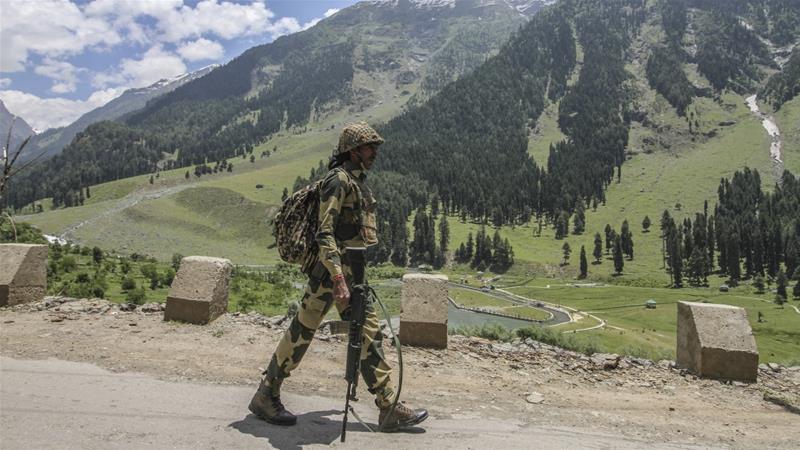Hezbollah Stronger?
Israel fears stronger Hezbollah 10 years after pull-out
By Heather Sharp, BBC News
Metulla, north Israel–Barely 100m from a picnic spot in Israel’s northern-most village, the yellow flag of the Lebanese militant group Hezbollah flutters in the breeze.
It was through Metulla that the last Israeli soldiers drove as they withdrew unilaterally from Lebanon in 2000, ending their 18-year presence in the country.
The troops had held a buffer zone in southern Lebanon, aiming to protect Israel’s northern border from militant attacks.
Now 10 years later, the scene is tranquil, although a major war was fought across this border in 2006, and the regional media is full of talk of Iranian-backed Hezbollah’s growing arsenal.
“In Metulla, it’s always business as usual,†says local resident Jonathan Javor, 28. “You still have to pick fruit, you still have to open your hotel, no matter what’s going on.â€
Metulla forms a finger of land jutting into Lebanon.
Its green orchards back right onto the border, overlooked by Lebanese villages on the hills beyond.
Israel invaded Lebanon in 1982, pushing as far as Beirut in an attempt to target Palestinian militants, but then drew back to hold a zone varying from about 5-20km (3-12 miles) into Lebanon, to protect border communities such as Metulla.
While many Lebanese civilians from the buffer zone crossed into Israel daily to work, Hezbollah and other militant groups fought a war of attrition against the Israelis and their Lebanese Christian allies, the South Lebanon Army.
On average, about two or three Israeli soldiers died each month.
The Four Mothers activists say soldiers were dying “for nothing’ in south Lebanon
Sitting on a sunny veranda in Kibbutz Ashdot Yaacov, an hour’s drive south, three friends reminisce together about the campaign they waged, as part of a group called Four Mothers, for the withdrawal.
“Many people called us saying ‘Please take my child out of Lebanon, I want him alive,†says Amalia Dayan.
The women are at pains to point out their commitment to sending their sons and daughters to defend Israel.
But Mrs Dayan says they felt losses in Lebanon were a sacrifice “for nothing,†in a long-standing occupation “with no goal.â€
Ten years on, the women have no regrets. Smadar Ben-Porat believes it is just a matter of time until the next war with Hezbollah, but she thinks the movement would have grown stronger whether or not Israel had pulled out.
“I believe it’s better for us to defend our country from legitimate borders,†she says.
Israeli President Shimon Peres recently accused Syria of transferring Scud missiles to Hezbollah. The US says the group now has more missiles than most governments.
There is a UN presence in south Lebanon, which was expanded as part of the 2006 ceasefire agreement, but few Israelis believe it has stopped Hezbollah rearming.
Alon Ben-David, military analyst for Israel’s Channel 10 television, believes Hezbollah has 40,000 rockets and long-range precision missiles with which it could strike targets such as military bases and power stations, which “makes the equation completely differentâ€.
“From a local guerrilla organisation, we’ve created a monster,†he says.
In 2000, the troops were pulled out ahead of schedule, in what was perceived on both sides as a hasty scramble. Hezbollah claimed it as a major victory.
“We boosted the radical axis – Iran, Syria and Hezbollah – we gave them a lot of encouragement in the withdrawal and I think we’re still paying the price for it,†says Mr Ben-David.
At present, he believes neither side has the incentive for another war, “because they realise what devastation it would cause on both sidesâ€.
But, he says, if Israel were to launch a pre-emptive strike against Iran’s nuclear programme, Hezbollah would be likely to hit back.
‘Necessity’
In Metulla, town mayor Herzel Boker dismisses talk of imminent war as “manufactured by journalists.â€
A commander in Israel’s south at the time of the withdrawal, he believes the pull-out was “a necessityâ€, but says it left the security situation “effectively without controlâ€.
Few Israelis argue that the troops should have stayed, but many wish they had left differently – as part of a peace deal with Syria and Lebanon, or at least without creating the impression of weakness.
Mr Boker is also angered that Israel did not make better provisions for the SLA fighters and their families. Some were able to rush across the border to begin new lives in Israel, but others were left behind and captured by Hezbollah.
The 2006 war began when Hezbollah seized two Israeli soldiers from the border region. Israel struck back, mainly at south Lebanon and Hezbollah areas in Beirut.
Some 1,200 Lebanese, mostly civilians, and some 160 Israelis, most of whom were soldiers, were killed.
Now, there are two Hezbollah ministers in Lebanon’s unity government and Israel has said it will hold Lebanon as a whole responsible for the activities of Hezbollah.
“If Lebanon creates an escalation, the state of Israel will react, and as we saw in 2006 it could react aggressively… if we will not live in peace, neither will they,†Mr Boker says.
12-22













2010
1,584 views
views
0
comments